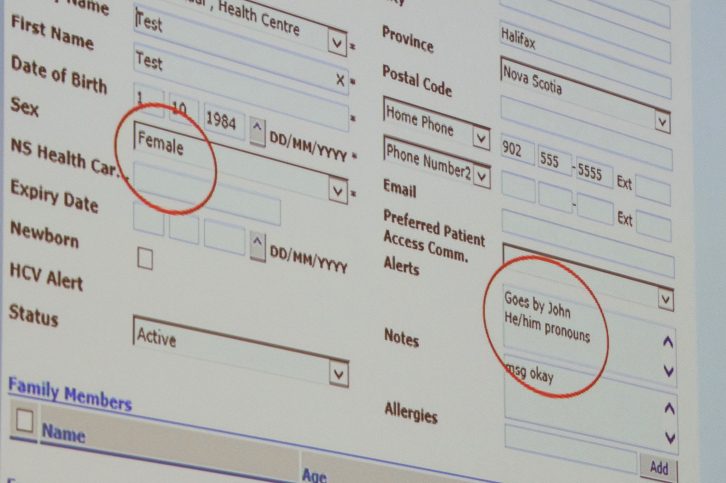Health
‘Simple’ changes could make dental offices more LGBTQ+ inclusive
Medical journal recommends changes to treatment of LGBTQ+ individuals

caption
Abbey Ferguson of the Halifax Sexual Health Clinic holds up a dental dam to a giggling crowd of dental professionals.Dental dams are a common tool in most dental offices, but show a group of dental workers and dentists a strawberry-flavoured dam used for safe-sex and they get very uncomfortable.
Promoting sexual health was discussed at a charity event for dental professionals on Friday. But Abbey Ferguson, health promotions co-ordinator for the Halifax Sexual Health Centre, focused her seminar on how to make dental offices more LGBTQ+ inclusive.
Ferguson addressed the crowd of 300 dental professionals at the private event called Learn to Give.
“Raise your hand if your office asks for pronouns and preferred name on your intake forms,” said Ferguson.
No one raised their hand.
That’s the exact reason one organizer of the charity event, oral surgeon Dr. Marco Chiarot, reached out to Ferguson in the first place.
“I think it’s important to be current and understand gender identity issues, and I think the best way to do that is to have an expert tell you,” said Chiarot.
Since his office felt they needed more education to make their space more inclusive, he guessed other dental offices probably felt the same.
During the talk, Ferguson said “simple” changes, like adding pronouns and preferred names to intake forms and patient files, can make a big difference.

caption
An example from Ferguson’s presentation of how to input pronouns and the name a person on electronic medical records.She said it’s important to start with the basics, but the learning process needs to be ongoing.
More than one barrier to care
Frank Heimpel, an outreach and education co-ordinator at South House, said those who use their service describe difficulties accessing health and dental care. South House is a sexual and gender resource centre.
But, Heimpel said discrimination is often not the largest hurdle LGBTQ+ people face regarding dental care.
“A big, obvious barrier to queer and trans people accessing services like dentistry is it’s expensive,” they said.
Like other marginalized groups, LGBTQ+ people face higher rates of poverty said Heimpel. According to the Canadian Mental Health Association, half of transgender people in Ontario earn less than $15,000 a year.
Bigger than dental health
The Halifax Sexual Health Centre already uses the inclusion methods Ferguson recommended in her talk. But it’s one of the few health centres that does.
On Jan. 21, the Canadian Medical Association Journal published a whole issue about transgender, non-binary and queer health outcomes. One article said small scale studies have shown including pronouns and names for transgender youth in primary care improves their mental health.
Next steps
Ferguson said a question and answer session is usually a big part of the Sexual Health Centre’s outreach. Follow-up workshops for individual clinics may also be a good next step, she said. As a non-profit clinic, the Sexual Health Centre is one of the few places in Halifax that offers classes targeted for practitioners.
Many of the attendees appreciated Ferguson’s talk.
“It was really helpful, especially the intake forms. I thought that was really awesome because we don’t really have that in ours, so it’s definitely something we can take away and use in our office,” said Shelby DeVan, a dental hygienist at Park West Dental Office.
Dentist Dr. Janin Wolfe said her practice has always been welcoming, but doesn’t have a specific system in place.
“Open to people from all walks of life, all genders and all presentations of gender,” she said. “We just need to make it a more official.”
Heimpel said it’s important not to get complacent.
“A one-hour talk, a three-hour talk, a one day talk is still not enough to affect change,” said Heimpel. “We need to do it more on a broad scale—a whole system change approach. Not just for people who are lucky enough to get training, but it should be mandatory part of getting certified for becoming a health-care provider.”


c
c['----']c
J
J